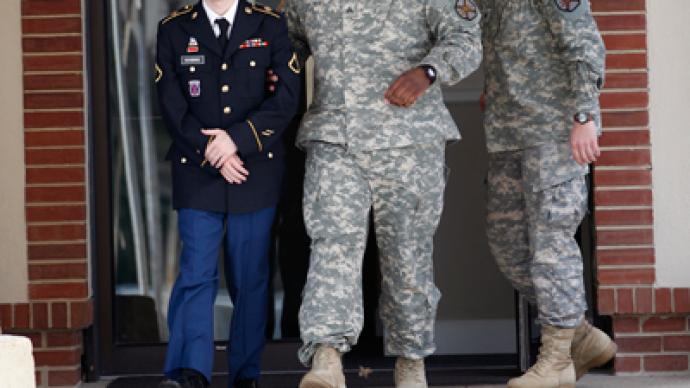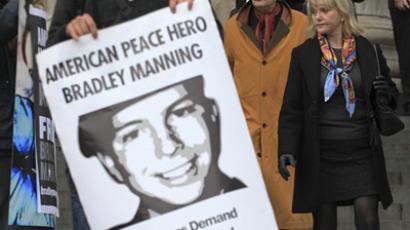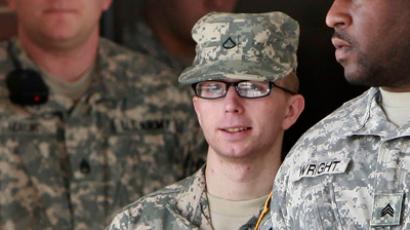Nobel laureates slam the US over Bradley Manning case

Leaders of the United States have insulted the intelligence of the rest of the world, three Nobel laureates write this week, because of their continuously perverse mishandling of the case against accused WikiLeaks source Pfc Bradley Manning.
Archbishop Desmond Tutu, Mairead Maguire and Adolfo Pérez Esquivel have authored a statement to be published in an upcoming issue of The Nation that condemns the United States’ persecution of the 24-year-old Army private and implores the rest of America to question the country’s secretive torture of a soldier that the prize winners say defended democracy. “As people who have worked for decades against the increased militarization of societies and for international cooperation to end war, we are deeply dismayed by the treatment of Pfc Bradley Manning,” the laureates write.“Questioning authority, as a soldier, is not easy.But it can at times be honorable. The words attributed to Manning reveal that he went through a profound moral struggle between the time he enlisted and when he became a whistleblower. Through his experience in Iraq, he became disturbed by top-level policy that undervalued human life and caused the suffering of innocent civilians and soldiers. Like other courageous whistleblowers, he was driven foremost by a desire to reveal the truth.”According to military prosecutors, Manning aided al-Qaeda in the Arabian Peninsula by providing Julian Assange’s WikiLeaks site with hundreds of thousands of sensitive files, including diplomatic cables and a controversial video of US troops executing civilians from an Apache helicopter over Iraq. Earlier this month, just shy of his nine-hundredth day under military custody where he suffers from conditions considered torturous by the United Nations, Manning told a judge during a pretrial motion hearing that he was willing to accept responsibility for contributing to the whistleblower website. Defense attorneys hope that the government takes the plea, relieving Manning from the harshest of the charges against him, including aiding the enemy and espionage, in exchange for admitting general fault. If his plea notice is rejected and Manning is court-martialed and convicted on those charges, however, the government could ask for a sentence of life in prison.In the letter from Tutu, Maguireand Esquivel, the laureates say Manning needs to be honored if he has done as accused, not made America’s whipping boy for blowing the whistle. Earlier this year, Manning was nominated himself for the 2012 Nobel Peace Prize by the Movement of the Icelandic Parliament, though the award was ultimately presented to the European Union.“Private Manning said in chat logs that he hoped the releases would bring ‘discussion, debates and reforms’ and condemned the ways the ‘first world exploits the third,’” the laureates write. “Much of the world regards him as a hero for these efforts toward peace and transparency, and he has been nominated for the Nobel Peace Prize as a result. However, much as when high-ranking officials in the United States and Britain misled the public in 2003 by saying there was an imminent need to invade Iraq to stop it from using weapons of mass destruction, the world’s most powerful elites have again insulted international opinion and the intelligence of many citizens by withholding facts regarding Manning and WikiLeaks.”“The military prosecution has not presented evidence that Private Manning injured anyone by releasing secret documents, and it has asserted in court that the charge of ‘aiding the enemy through indirect means’ does not require it to do so. Nor has the prosecution denied that his motivations were conscientious; it has simply argued they are irrelevant. In ignoring this context and recommending a much more severe punishment for Bradley Manning than is given to US soldiers guilty of murdering civilians, military leadership is sending a chilling warning to other soldiers who might feel compelled by conscience to reveal misdeeds. It is our belief that leaders who use fear to govern, rather than sharing wisdom born from facts, cannot be just.”Manning was one of just six persons charged by the Obama administration under the antiquated, World War One-era Espionage Act of 1917, until last week when Navy linguist James Hitselberger became number seven in the president’s perpetually growing list of persons targeted for allegedly airing state secrets. Earlier this month, former CIA agent John Kiriakou, who was prosecuted by the government for blowing the whistle on the enhanced interrogation practices enforced on suspected terrorists under President George W. Bush, was presented in Washington with a Callaway Awards for Civic Courage because of his commitment to exposing the government’s wrongdoings.“I may have been on the wrong side of the government, but in my heart I’m on the right side of history,” Kiriakou said during his acceptance speech. Kiriakou was expected to be sentenced to upwards of 45 years in prison for his whistleblowing until he, like Manning very might, pleaded to lesser crimes in exchange for a weaker sentence.According to chat logs the government says show a confession between Private first class Manning and confidant Adrian Lamo, the soldier said he hoped the leaks would expose "one of the more significant documents of our time, removing the fog of war and revealing the true nature of 21st century asymmetrical warfare." The letter published in The Nation echoes that explanation and asks Americans to reconsider what Manning is accused of — an action that WikiLeaks founder Julian Assange says was an impetus in ending the Iraq War.“We Nobel Peace Prize laureates condemn the persecution Bradley Manning has suffered, including imprisonment in conditions declared ‘cruel, inhuman and degrading’ by the United Nations, and call upon Americans to stand up in support of this whistleblower who defended their democratic rights,” the award winners write. “In the conflict in Iraq alone, more than 110,000 people have died since 2003, millions have been displaced and nearly 4,500 American soldiers have been killed. If someone needs to be held accountable for endangering Americans and civilians, let’s first take the time to examine the evidence regarding high-level crimes already committed, and what lessons can be learned. If Bradley Manning released the documents, as the prosecution contends, we should express to him our gratitude for his efforts toward accountability in government, informed democracy and peace.”Manning will be back in military court next week when pretrial motion hearings continue from Ft. Meade, Maryland before his court-martial, expected to start next year.














